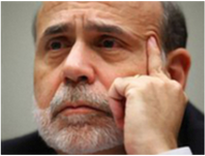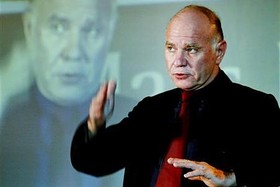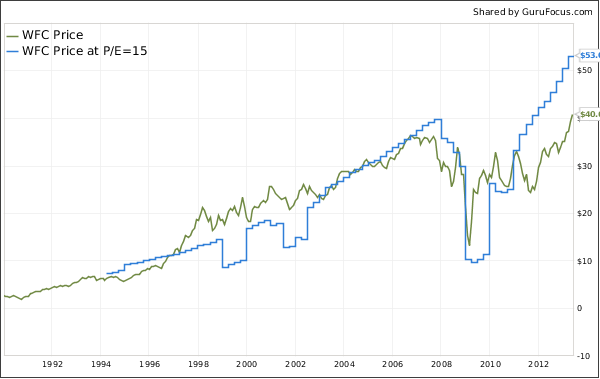Personal Finance

The Bloomberg Consumer Comfort Index rose to minus 27 in the period ended July 28, the strongest reading since January 2008, from minus 27.3 a week earlier. The margin of error for the headline figure is 3 percentage points. Measures of personal finances and buying climate were also little changed.
….read more HERE
 Fed Frets Over High Mortgage Rates, ‘Low’ Inflation Level
Fed Frets Over High Mortgage Rates, ‘Low’ Inflation Level
The Federal Reserve said on Wednesday the economy continues to recover but is still in need of support, offering no indication that it is planning to reduce its bond-buying stimulus at its next meeting in September.
The central bank said after a two-day meeting that it would keep buying $85 billion in mortgage and Treasury securities per month in its effort to strengthen an economy that it said was still challenged by federal budget-tightening. It also pointed to a recent run up in mortgage rates.
In a post-meeting statement, policymakers described economic activity as having expanded at a “modest” pace in the first half of the year. They had called the recovery “moderate” after their last meeting in June.
In another departure, the Fed’s policy-setting committee signaled some concern about the low level of inflation.
…..read more HERE
The July FOMC Statement – A Brief Comment
Keeping the Kremlinologists Busy
Amazingly, this month’s FOMC statement incorporates altogether six changes from the previous statement. Can we still call it a carbon copy? Yes, we can. We can, because that’s what it essentially is. Readers can see all the alterations at a glance via the WSJ’s handy ‘Fed statement tracker‘.
Still, with six words, respectively half-sentences changed, Kremlinologists will be very busy parsing this statement and attempting to extract its meaning. The main question will be: will they keep printing? It actually appears that the irrational ‘taper fears’ can now be laid to rest. We have maintained throughout the debate that the idea that the Fed would ‘tighten policy’ in any way, shape or form, was essentially a media hoax from the beginning. Most likely, the whole artificial debate was a ‘trial balloon’, to see how the markets would react. In addition, the Fed is always eager to maintain that its policy of rapid inflation is actually not inflationary, which is to say it attempts to ‘manage inflation expectations’. ‘Tapering’ and ‘exit’ talk are simply part of its propaganda arsenal to that effect.
We think Peter Schiff had it exactly right when he said that the mythical ‘exit’ is akin to doing the old table-cloth trick, but amounts to an attempt to pull out the whole table, not just the cloth, while hoping that the glasses and plates will continue to levitate on their own. The Fed won’t have much opportunity to practice to make sure that the magic trick will ‘work’.
So what is there to say about the changes in the statement?
….read more HERE
Some 3.27 million new cars are now sitting on lots across the U.S., more than there have been in almost five years, according to Automotive News. A year ago at this time, by contrast, there were 2.7 million vehicles lying in wait across the country; summer 2011 saw an inventory of about 1 million fewer cars.
But there are a few, very real reasons for car executives to be confident….
….read why HERE
In his excellent book One Up on Wall Street, Peter Lynch, the best mutual fund manager ever, revealed a powerful charting tool that helped him to achieve a gain of 29.2% in his portfolios for 13 years. In this chart, Peter Lynch drew the stock price and the earnings per share together and aligned the value of $1 in earnings per share to $15 in stock price. He wrote in pages 164-165 of the book:
…..read view the explanation of the chart HERE
Given more than his normal 30-second soundbite on mainstream media, Marc Faber is able to discuss in considerably more detail his views on the massive growth in global financialization (when compared to real economies) noting that “one day, this financial bubble will have to adjust on the downside.” This will occur via either an inflationary burst or a collapse of the system. Simply put, “it’s gonna end one day,“either through war or financial collapse,” it will be very painful.” The Gloom, Boom, and Doom Report editor notes current asset valuations are driven by excess credit creation, printing money, and distorted market signals, and the unintended consequences of the effect on investor psychology are perfectly mis-timed. Faber concludes with a discussion of the inflationary impact of US monetary policy and where it is seen (and not seen) and the global social unrest implications of middle class discontent.
QE will not End with Ben Bernanke
Money Printing will End only when The System Breaks Down
 Dr. Faber asked if money printing would end and when:
Dr. Faber asked if money printing would end and when:
Yes, until the system breaks down. My view would be that there will be money printing, and the problem with money printing is always that you don’t control where it goes to. Ideally, it would go into higher incomes of the middle class and of the working class, but this hasn’t really happened. The real wait is for the typical household or the medium household, they are going down. What is going up is basically selected asset markets, like the real estate market has recovered. In some areas, we’ve hit new highs. The stock market has gone up. But as you know, only very few people own stocks in the United States, so it doesn’t impact the wealth of the majority of people.
Marc Faber: I dont know what the End Game will be
SMN: But do you think that will be worth anything?
Marc Faber: I don’t know what the end game will be, and whether we’ll still be alive or whether we’ll be in wars or in revolutions as the worst. That’s why I want to hold some physical gold. There’s no point to hold physical gold somewhere in the sky. I would hold some physical gold in my proximity. In other words, I own some in Thailand and some in Hong Kong. I still have too much in Europe, but over time, I will move it to Asia.
….. in Sprott money News Interview: Click Here to watch the full interview >>>>>>














